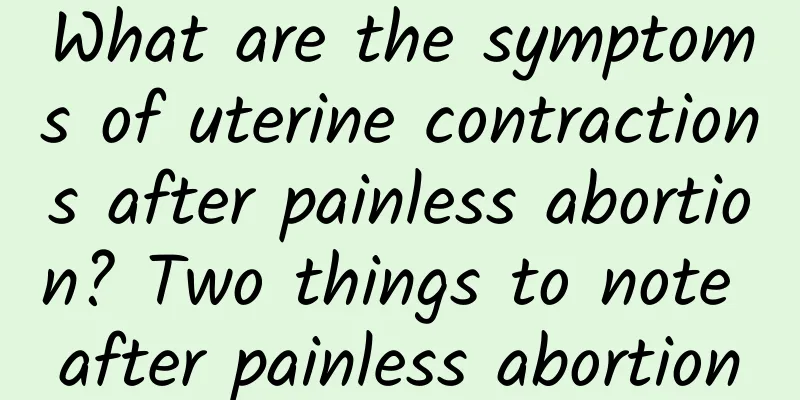What does it feel like to have a miscarriage? You must pay special attention to your personal lifestyle habits

|
Many women may experience miscarriage after becoming pregnant, so women must pay special attention to their personal living habits during pregnancy. Because the first three months of pregnancy are not particularly stable, and the embryo may terminate after developing to a certain extent, there is a certain degree of miscarriage. So what does a natural miscarriage feel like? What does it feel like to have a miscarriage? Although many women are very careful in their daily lives, they may still have spontaneous abortions. Doctors must pay special attention to women who are more prone to spontaneous abortions. Women may not be particularly clear about what feelings and common manifestations they will have in their daily lives; insomnia, anxiety, suspicion, panic and other common manifestations are very common. Another situation is that some women have endocrine dysfunction during pregnancy. This situation is very rare, but it can also cause spontaneous abortions for some women. If a woman has some reproductive organ diseases, she may suffer from miscarriage during pregnancy. When miscarriage occurs, the main symptoms are lower abdominal pain and blood clots in the lower body. Some women may experience dizziness and vomiting, and often feel very tired in the previous stage of miscarriage. The feeling of spontaneous abortion refers to the abdominal pain, irregular vaginal bleeding and even obvious contractions of the uterus that women may experience during the pregnancy. These are all manifestations of the feeling of spontaneous abortion. During this stage, women's bodies will obviously have various problems. If they are not properly treated and handled, the fetus may not be saved. Can I still get pregnant after a miscarriage? Generally, the initial stage of miscarriage lasts for one to two weeks. In particular, there will be a small amount of vaginal bleeding, accompanied by mild pain in the lower abdomen. Generally, in the late stage, there will be paroxysmal abdominal pain. Especially for early patients, it is usually some time after amenorrhea, and then there will be early pregnancy reactions, and vaginal bleeding may even be small and red, and sometimes accompanied by pain in the lower back and a feeling of falling, especially during the examination. If the treatment is timely, the pregnancy can continue. When miscarriage occurs, part of the embryo has been expelled from the body, but there will still be a small amount of residue in the uterine cavity. This is usually caused by incomplete miscarriage, so at this time there will be continuous vaginal bleeding. This is because the uterus cannot contract well. To sum up, when a miscarriage occurs, the first thing to do is to preserve the fetus. After all, during pregnancy, every female friend attaches great importance to the fetus, and once a miscarriage occurs, it will obviously cause various damages to the body. Therefore, when a miscarriage occurs at the beginning, you should first see if you can preserve the fetus. If you really can't preserve it, then you can take other measures. |
Recommend
How to properly care for vulvar leukoplakia?
In recent years, with the continuous improvement ...
TCM Syndrome Differentiation and Classification of Delayed Menstruation in Patients with Irregular Menstruation
Delayed menstruation in patients with menstrual d...
What is the cause of irregular menstruation?
What causes irregular menstruation? The reasons f...
Eat hotpot in cold weather to prevent calorie overload! Nutritionists teach you "3 tips" for eating hot pot, warming your stomach, low in calories and without any burden
The Beginning of Winter is coming on November 7th...
Apple spinach helps you lose weight! Low GI helps control appetite
Controlling calories at every meal, but still can...
Is it normal to have less bleeding after painless abortion?
Is it normal to have less bleeding after painless...
How long is the best time to have an abortion during pregnancy
Nowadays, many young people pursue pleasure and t...
Ladies, please pay attention to menstrual hygiene during your menstrual period!
Every woman wants to have a healthy body, but the...
What is right side adnexitis?
Right adnexitis is one of the common inflammation...
Is the cost of treating functional uterine bleeding expensive?
Functional uterine bleeding, also known as DUB, i...
Genetics is the most common cause of ovarian cysts
Ovarian cysts have brought a lot of harm to femal...
Where is the most professional place to treat cervical warts
When a patient falls ill, he or she will entrust ...
The MDD diet prevents dementia and makes the brain more than 7 years younger
Using diet to delay dementia, including the Medit...
Is hyperprolactinemia serious for patients?
Hyperprolactinemia refers to a syndrome caused by...
What are the better methods for detecting endometrial tuberculosis?
Endometrial tuberculosis is a common gynecologica...









